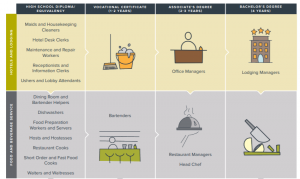15 Jul Transitioning Careers
Struggling to find work in your industry? Map a new career pathway using your existing skills!
Since Mid-March, millions have filed for unemployment, including 36 million Americans, almost 1 million North Carolinians, and an estimated 100,000 Mecklenburg County residents. If you are one of the many people to have had your career impacted by this pandemic already, we wanted to share some practical tips for transitioning careers in this unprecedented time. Traditionally, career pathways are mapped out for a specific industry to show how experience in lower-level positions, in tandem with education, can provide advancement opportunities for individual job seekers. This leverages industry-specific knowledge and requires individuals to add more skills to their proverbial toolbelt in order to remain competitive in the job market.
However, the current reality in this pandemic is that certain industries, such as Hospitality, have been disproportionately impacted.

Excerpt from Charlotte Works Hospitality Career Map
Traditional approaches to employments are inadequate for preparing individuals for work when an entire industry (Hospitality) has lost so many jobs.
If our traditional approach is inadequate, what is the solution to connect people to employment opportunities now? The solution is surprisingly simple, by breaking a job down into its fundamental components and understanding that work experience just means gaining specific skills. In addition to the experience and skills developed by a role, many of us have other untapped skills that we are not using in our current role that this pathway map process can factor into the equation. Looking at it through a pathway map, we can see that we may already have the means to transition from one industry to another, or at the very least more clearly identify specific training needed to be ready to enter a new field. This approach makes it possible for you to see if you have 7 out of 10 required skills for a new role and exactly what training and development you will need to be a competitive candidate for these roles in new industries.
Maybe this also sounds great in theory, but you are concerned about how you will pay for this training if you are currently unemployed? NCWorks Career Centers are here to help, and we provide services such as individual training accounts and career services that could help pay for your training. To learn more about how to take advantage of the resources of our career centers please visit www.ncworks.gov.
Going back to the example of the Hospitality industry, let’s take a more detailed look at the most common jobs from this industry and the required skills for each:
- Combined Food Preparation and Serving Workers, Including Fast Food
- Customer Service
- Food Production
- Public Safety and Security
- English Language
- Sales and Marketing
- Waiters and Waitresses
- Customer Service
- English Language
- Sales and Marketing
- Food Production
- Administration and Management
- Hosts and Hostesses, Restaurant, Lounge, and Coffee Shop
- Customer Service
- Food Production
- Production and Processing
- Administration and Management
- Personnel and Human Resources
With some of the top jobs in the Hospitality and Tourism industry, we see a pattern of transferable skills such as Customer Service, English, and Administration Management. Within these three baseline skills alone, there is a projected job growth of 42% in the next 10 years. Within the Retail industry, as a retail sales associate, 53% of jobs in this occupation require at least two of these skills. In the past year alone, 3,252 retail sales associate positions have become available in Mecklenburg county. While there might be some additional training needed, an office receptionist/administrative assistant has 27% of their listed jobs requiring these prerequisite skills. With these skills, there have been 1,179 jobs posted in the past year that highlight a need for both Customer Service and English-speaking experience. This specific occupation is housed in several industries outside of Hospitality, including both Health Care & Social Assistance and Retail Trade. Job seekers should expand their search to include available positions that require these skills. It not only will help garner a greater number of leads, but it will also provide opportunities to apply essential skillsets in other capacities.
While these transferable baseline skills are necessary, they are not always enough; some roles require specialized skills. For example, the jobs listed below are great opportunities for those working in the Hospitality Industry, but require some additional skills. These top jobs are a fit with those three baseline skills with the additional specialized skills highlighted.
Customer Service Representative:
- Data Entry
- Microsoft Office/Computer Literacy
- Sales
- Retail Industry Knowledge
Retail Sales Associate:
- Sales
- Retail Industry Knowledge
- Merchandising
- Computer Literacy
Office/Administrative Assistant:
- Data Entry
- Microsoft Office-Excel
- Spreadsheets
- Scheduling
In closing, there are several ways to apply previous employment experience to transition your career to a new industry. As you can see, many of these specialized skills are transferable amongst multiple roles and can set individuals up for future career success. Charlotte Works offers several programs via its training providers to help job seekers fill in skills gaps. To find out more about these programs and opportunities, visit us on the Charlotte Works website, and stay in touch via our social media (Facebook, Twitter, Instagram, and LinkedIn).
Jobs are available on the Charlotte Works website, filtered by education level here.
Coauthors: Nahom Kahsay, Kevin Loux


